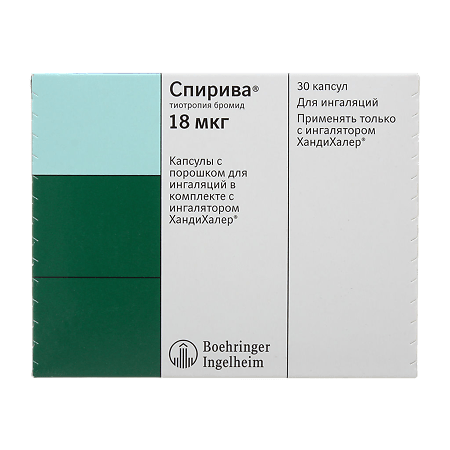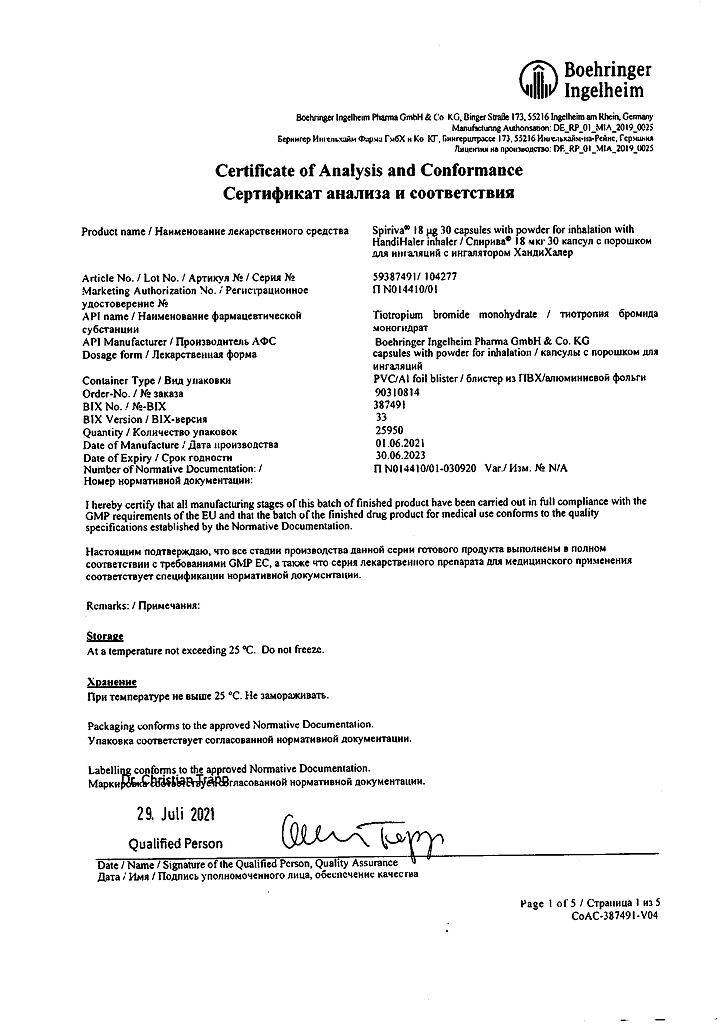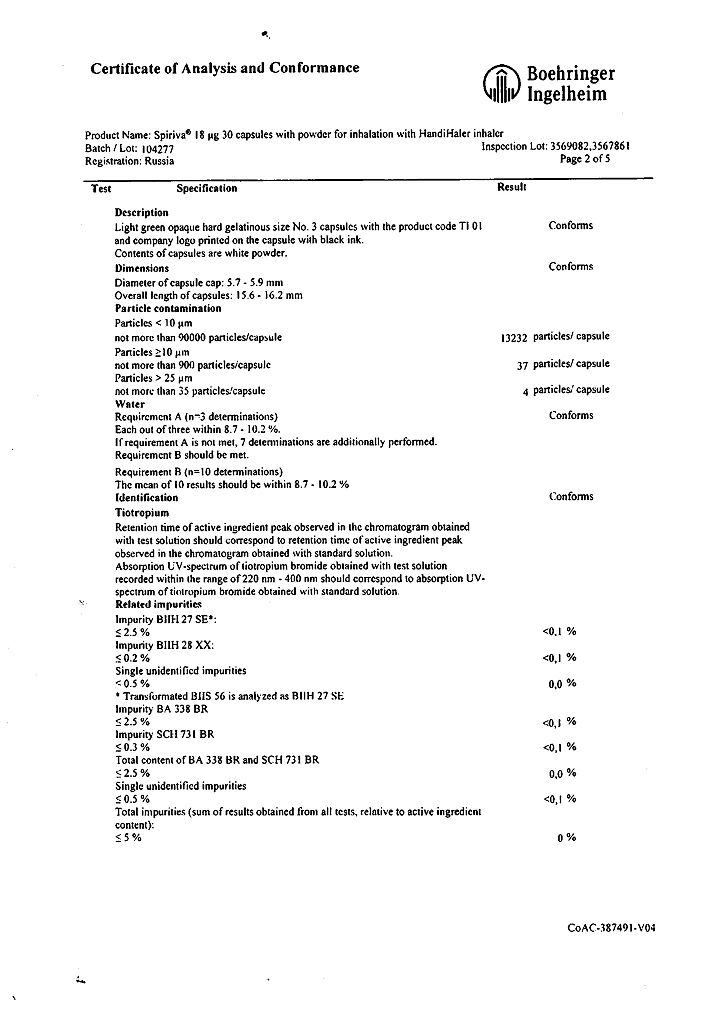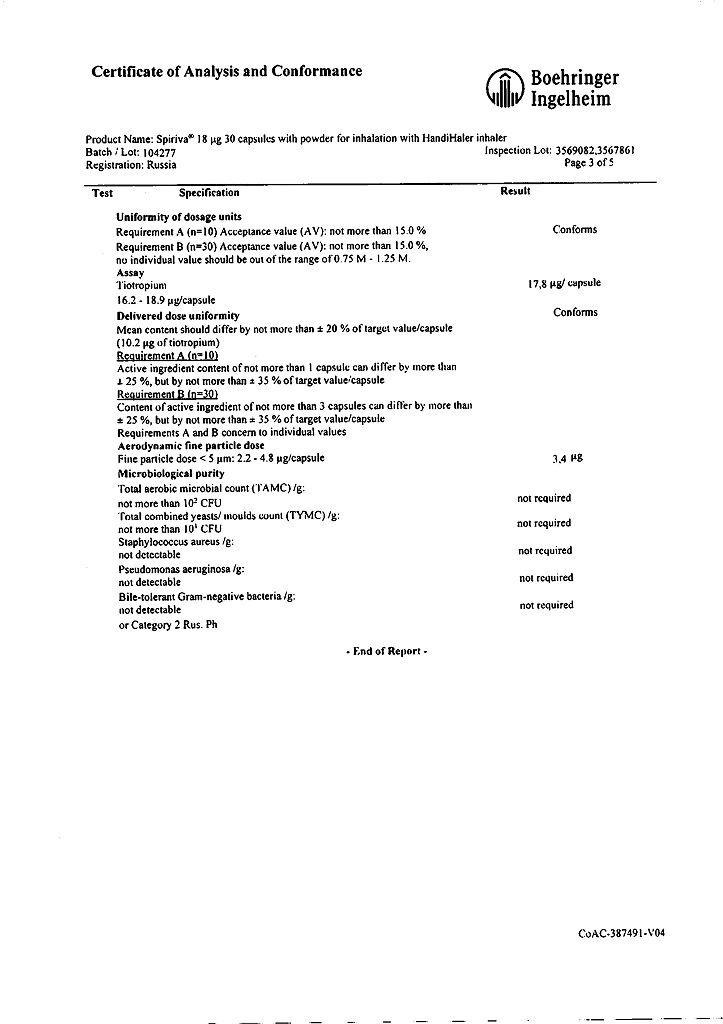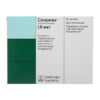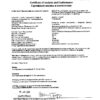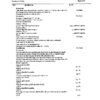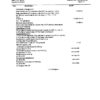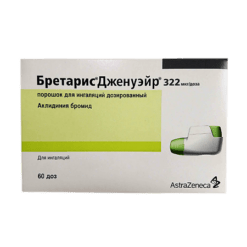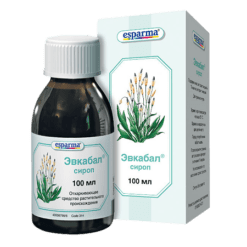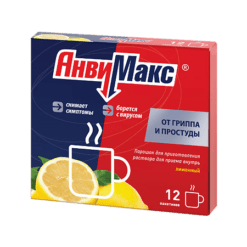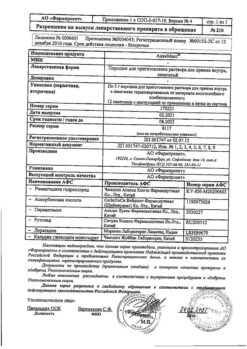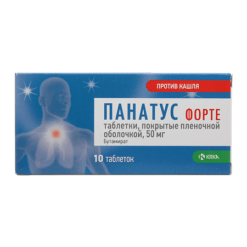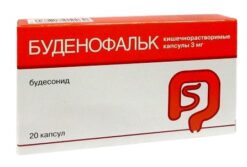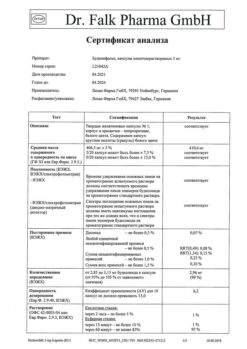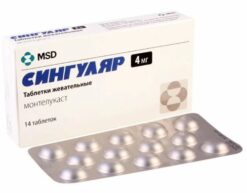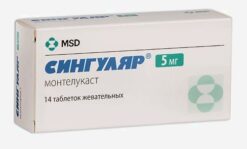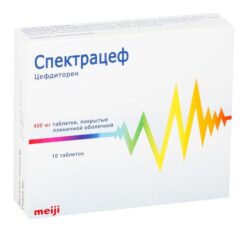No products in the cart.
Spiriva, 18 mcg blisters 30 pcs, complete with inhaler
€61.04 €50.87
Description
Spiriva – as a result of inhibition of the activity of M3-cholinoreceptors in the respiratory tract there is the removal of spasm, relaxation of the smooth muscles.
The bronchodilator effect is determined by the size of the dose and lasts at least a day. This significant duration of action of Spiriva appears to be due to its very slow release from binding to M3-cholinoreceptors compared to, for example, ipratropium.
When administered by inhalation, tiotropium has a local selective effect, with no negative systemic anticholinergic side effects at therapeutic doses. Release of tiotropium from binding to M2-cholinoreceptors is significantly faster than from binding to M3-receptors.
High affinity for cholinoreceptors and gradual release from binding to them provide a pronounced and prolonged bronchodilator effect in patients with chronic obstructive pulmonary disease.
Indications
Indications
SPIRIVA is indicated as maintenance therapy in patients with COPD, including chronic bronchitis and emphysema (maintenance therapy for persistent shortness of breath and to prevent exacerbations).
Active ingredient
Active ingredient
Composition
Composition
1 capsule:
– tiotropium 18 mcg, equal to 22.5 µg tiotropium bromide monohydrate
Associated substances:
Lactose monohydrate, 200 M;
Lactose monohydrate micronized.
Capsule composition:
macrogol 3350 (PEG 3350),
indigo carmine (E 132),
Titanium dioxide (E 171),
Iron oxide yellow (E 172).
How to take, the dosage
How to take, the dosage
Inhaled.
When using SPIRIVA as inhalation with the HandyHaler® device, it is recommended that one capsule per day be used at the same time.
The drug does not need to be swallowed.
Elderly patients should take SPIRIVA in the recommended doses.
Patients with impaired renal function may use SPIRIVA in the recommended doses. However, careful monitoring of patients with moderate to severe renal impairment receiving SPIRIVU (as with other drugs that are mainly excreted by the kidneys) is necessary.
Patients with hepatic impairment may take SPIRIVA at recommended doses.
HandyHaler® Instructions for Use
The HandyHaler device was specifically designed for SPIRIVA. It should not be used for other medications. You can use your HandyHaler® for one year.
The HandyHaler includes:
1) dust cap;
2) mouthpiece;
3) base;
4) piercing button;
5) central chamber.
Using the device HandyHaler
1. Open the dust cap by pressing the piercing button fully and then releasing
2. Open the dust cap completely by lifting it up. Then open the mouthpiece by lifting it upwards.
3.Take out the SPIRIT capsule from the blister (just before use) and put it into the central chamber as shown in the picture. It does not matter which side of the capsule is placed in the chamber.
4. Close the mouthpiece tightly until it clicks, leave the dust cap open.
5. Holding the HandyHaler with the mouthpiece up, press the piercing button only once to the end and then release. This will create an opening through which the medication is released from the capsule during inhalation.
6. Exhale completely. Caution: Never exhale into the mouthpiece.
7. Take the HandyHaler in your mouth and squeeze your lips tightly around the mouthpiece. Keeping your head straight, inhale slowly and deeply but with enough force to hear or feel the vibration of the capsule. Inhale until your lungs are completely full; then hold your breath until you feel discomfort while taking the Handi-Haler out of your mouth. Continue breathing calmly. Repeat procedures 6 and 7 to completely empty the capsule.
8. Open the mouthpiece again. Take out and throw away the used capsule. Close the mouthpiece and dust cap to store your HandyHaler.
Interaction
Interaction
The use of tiotropium in combination with other drugs commonly used to treat COPD is possible: sympathomimetics, methylxanthines, oral and inhaled glucocorticosteroids.
Limited information about concomitant use with anticholinergic drugs was obtained from 2 clinical studies: a single dose of ipratropium bromide against continuous administration of SPIRIVA in patients with COPD (64 patients) and in healthy volunteers (20 subjects) did not result in decreased adverse reactions, changes in vital signs and electrocardiogram.
The continuous co-administration of anticholinergic drugs and SPIRIVA, however, has not been studied and, therefore, is not recommended.
Special Instructions
Special Instructions
SPIRIVA, as a once-daily bronchodilator for maintenance treatment, should not be used as initial therapy for acute attacks of bronchospasm, i.e., emergencies.
After inhalation of SPIRIVA powder, immediate hypersensitivity reactions may develop. Inhalation of the drug may lead to bronchospasm.
Patients with moderate to severe renal impairment (creatinine clearance ⤠50 mL/min) should be monitored closely when taking SPIRIVA, as is necessary in other cases of drugs that are excreted primarily by the kidneys.
Patients should be familiarized with the use of SPIRIVA capsules. The powder should not be allowed to get into the eyes. Ocular pain or discomfort, blurred vision, and visual halos combined with red eyes, conjunctival congestion, and corneal edema may indicate an acute attack of closed angle glaucoma. If any combination of these symptoms develops, consult a specialist immediately. Use of drugs that cause miosis is not an effective treatment option in this case.
SPIRIVA should not be used more than once a day.
The SPIRIVA capsules should only be used with the HandyHaler device.
One dose/capsule contains 5.5 mg of lactose monohydrate.
Impact on ability to drive or operate machinery.
There have been no studies to study such effects. Cases of dizziness and blurred vision while taking the drug may have this effect.
Contraindications
Contraindications
Hypersensitivity to atropine or its derivatives (e.g., ipratropium or oxytropium) or other drug components; in the 1st trimester of pregnancy; children under 18 years.
With caution.
Closed-angle glaucoma, prostatic hyperplasia, bladder cervical obstruction.
Side effects
Side effects
Gastrointestinal tract
â¥1% and < 10% – Dry mouth, usually mild, which often disappears with continued treatment.
â¥0.1% and < 1% – Oral candidiasis.
â¥0.01% and < 1% – Constipation, gastroesophageal reflux.
In isolated cases intestinal obstruction, including paralytic ileus, dysphagia.
Respiratory system
â¥0.1% and < 1% – Dysphonia. Bronchospasm, cough, and local irritation, including pharyngeal irritation (same as with other inhaled agents).
â¥0.01% < 1% – Nasal bleeding.
Cardiovascular System
â¥0.01% and < 1% – Tachycardia. Heart palpitations.
In single cases, supraventricular tachycardia and atrial fibrillation have been reported.
Urogenital system
â¥0.01% and < 1% – Difficulty in urination and urinary retention (in men with predisposing factors). Infections of the urinary tract.
Allergic reactions:
â¥0.01% and < 1% – Rash, urticaria, pruritus, hypersensitivity reactions, including immediate-type reactions.
Single cases of angioedema.
Nervous system:
â¥0.1% and < 1% – Dizziness.
Most of the above adverse reactions may be due to the anticholinergic effects of SPIRIVA. Other anticholinergic effects may also occur – blurred vision, increased intraocular pressure (â¥0.01% and < 0.1%), glaucoma in single cases.
Overdose
Overdose
An anticholinergic effect may occur with high doses.
Similarities
Similarities
Additional information
| Shelf life | 24 months |
|---|---|
| Manufacturer | Boehringer Ingelheim Pharma GmbH & Co. |
| Medication form | capsules with powder for inhalation |
| Brand | #Н/Д |
Related products
Buy Spiriva, 18 mcg blisters 30 pcs, complete with inhaler with delivery to USA, UK, Europe and over 120 other countries.

